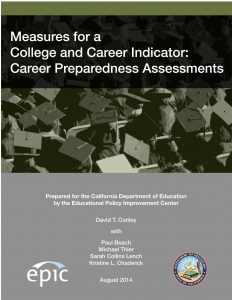
This white paper considers the career preparedness assessments used most widely by state educational systems—specifically ACT’s WorkKeys, the Armed Services Vocational Aptitude Battery (ASVAB), the National Occupational Competency Testing Institute (NOCTI), and industry certification assessments—as measures to be considered for California’s college and career indicator. The paper begins by presenting a brief overview of career preparedness assessments and their current applications in other states’ accountability systems. Next, career preparedness assessments are evaluated against the framework being used for all five categories of potential college and career preparedness measures. This white paper concludes with a summary that identifies major strengths, weaknesses, and tradeoffs.
From the Conclusion:
The degree to which the career preparedness assessments analyzed in this white paper vary in design, format, content coverage, purpose, and levels of maturity should not be surprising. This variation reflects the complexity of career preparedness—no single assessment can measure all the necessary skills. WorkKeys focuses primarily on the foundational skills needed to be successful in many careers but lacks the focus on specific technical skills necessary for success in a particular occupation. Conversely, NOCTI and industry certifications measure the technical skills needed for specific careers at the expense of measuring the metacognitive skills critical for career success.
The lack of research surrounding career preparedness assessments, as evidenced by the low evaluative criteria ratings relative to other college and career indicator measures reviewed in this white paper series, should also not be surprising. Although college and career preparedness are both relatively new fields in education, college preparedness has received the bulk of the attention. Vocational education, with its long tradition of tracking students, just recently reinvented itself as CTE, adding emphasis to students learning academic, technical, and metacognitive skills. A deeper understanding of career preparedness assessments will evolve as more researchers grapple with what it means to be prepared for a career, and more state accountability systems begin to prioritize career assessment.
Authors: David Conley, Paul Beach, Michael Thier, Sarah Collins Lench, Kristine Chadwick






